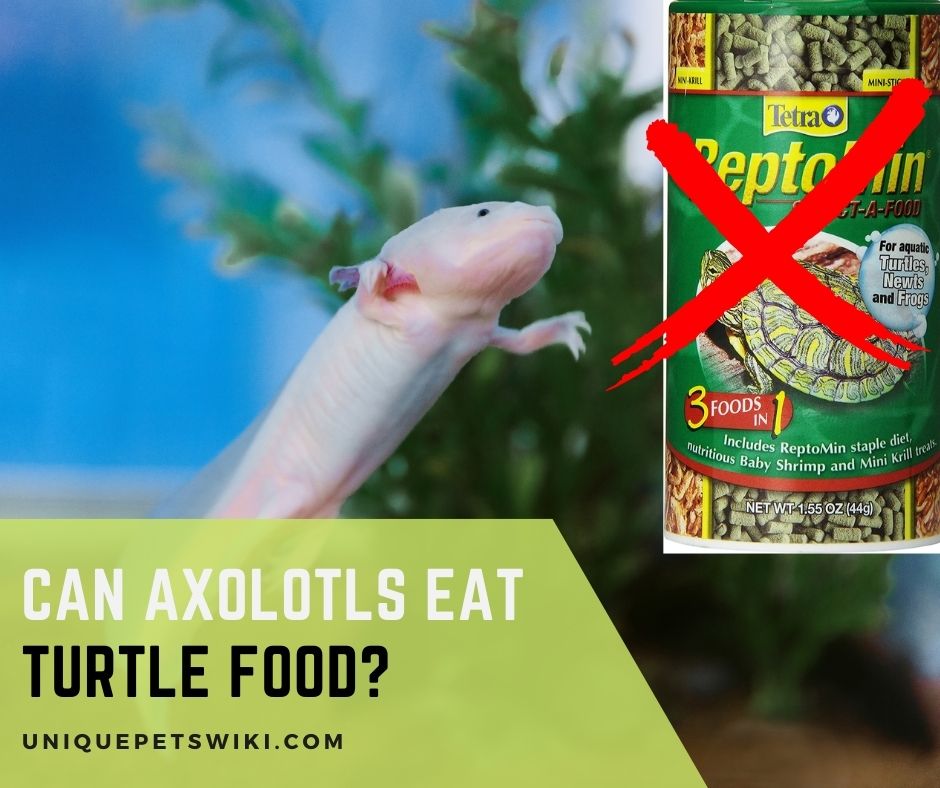There are two main reasons why people ask the question: can axolotls eat turtle food? The first is that they have some turtle food leftover which they may be hoping to finish off by feeding it to their axolotls or other aquarium pets.
The second is that they are simply fact-checking. They may want to improve their general knowledge by finding out if axolotls can safely eat turtle food.
No matter what your reason is behind asking the question ‘can axolotls eat turtle food?’ we are sure this guide will help you answer it.
Contents
Can Axolotls Eat Turtle Food? (The Short Answer)
No. Axolotls should not eat turtle food as it contains more carbohydrates than proteins and is not nutritionally balanced for axolotls.
Turtle food pellets could lead to digestive issues as well as hormonal imbalances in axolotls. Furthermore, it could cause serious impaction that could be fatal for axolotls.
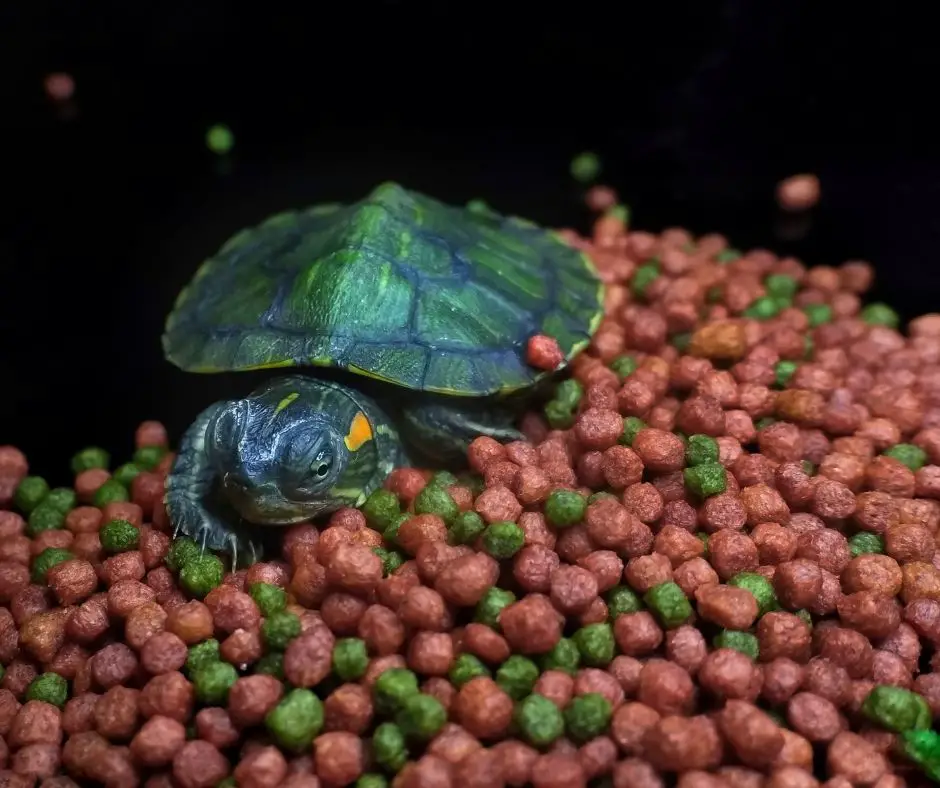
Can Axolotls Eat Turtle Food? (The Long Answer)
To answer this question, we need to take a look at a turtle’s diet.
Young turtles are omnivores, therefore, juvenile turtle pellets may contain chicken, shrimp, worms, krill, crickets, and feeder fish. These ingredients are acceptable for axolotls.
However, turtle foods are not just protein-based. They are also likely to contain carbohydrates in the form of vegetables so you will find ingredients such as plants, algae, zucchini, collard greens, seaweed, seagrasses, etc. in them.
In fact: almost 50% of turtle food is known to contain plant-based ingredients or carbs. These are not acceptable for axolotls.
Also, as turtles age, they need less and less protein and become herbivores. Resultantly, turtle food for adult and senior turtles could be completely plant-based. This food is totally unacceptable to axolotls.
Bottomline – axolotls should not eat turtle food since it is low in protein and higher in carbohydrates making it completely nutritionally unbalanced for axolotls.
Risks of Feeding Axolotl Turtle Food
There are three main risks of feeding turtle food pellets to axolotls:
- Nutrition imbalance
- Difficult to digest
- Hormonal issues
- Nutrition imbalance
Every organism needs nutritionally balanced meals to thrive.
Axolotls mainly need protein-rich foods containing worms, feeder fish, shrimp, earthworms, etc. They eat most small vertebrates that can fit inside their mouths.
On the other hand, turtles need different foods based on their age. A young turtle needs more animal-based foods but as it grows, it needs more herbs or plant-based foods. Turtles also need to eat calcium-rich diets. Land turtles need different food compared to sea turtles.
Sure, a brand of turtle food might contain certain ingredients such as feeder fish, shrimp, small fish, etc – ingredients that axolotls eat – but the food might also contain plants such as collard greens, zucchini, etc. – ingredients that are simply not necessary for an axolotl.
Without a healthy and balanced diet, your axolotl might remain undernourished. It could also result in nutritional deficiencies and, subsequently, diseases in axolotls.
- Difficult to digest
Plant-based or fiber-rich foods can also be very hard-to-digest for an axolotl.
An impaction in axolotl occurs when there is a blockage in its intestines. This blockage prevents the axolotl from having a normal bowel movement. Severe impaction might even prevent your axolotl from having a normal appetite. In severe cases, if the block is not removed surgically, the axolotl could die.
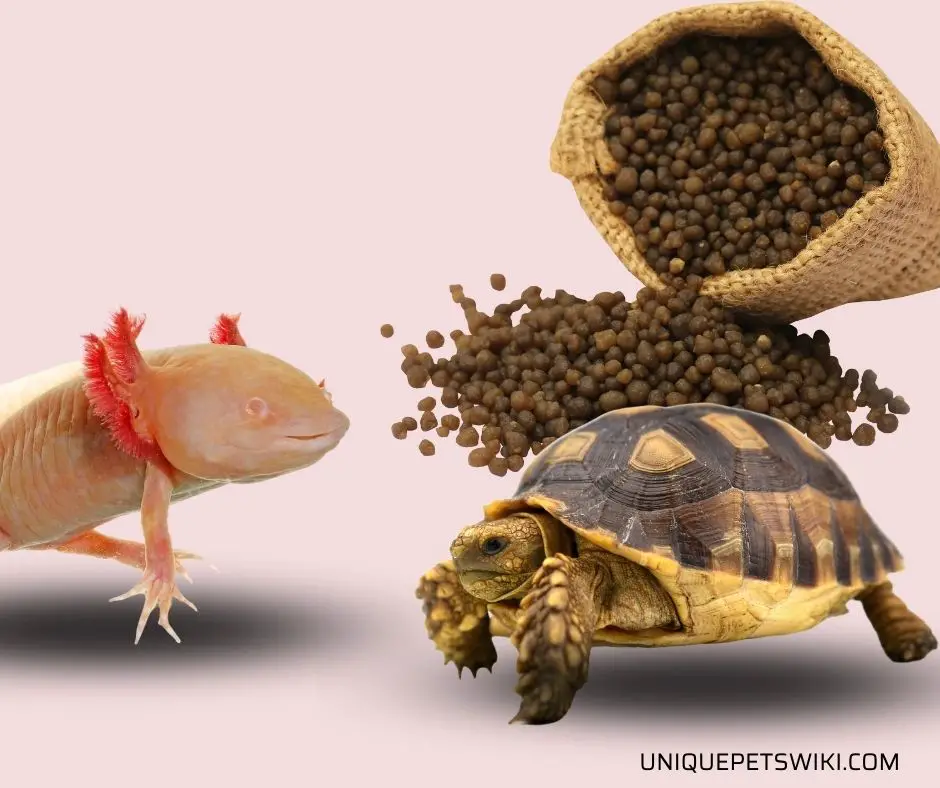
- Hormonal issues
Research shows that unbalanced diets can cause severe hormonal imbalances in humans and the same is true in the case of our aquatic pets.
Turtle diets with their high carbohydrate, calcium, and phosphorus content could trigger hormonal issues in axolotls.
Since most turtle foods contain 50% carbohydrates. If the axolotl eats such a diet on regular basis, its body has to work extra hard to maintain its blood sugar levels. This can lead to excess secretion of hormones to regulate these levels.
Hormonal imbalances can disturb an axolotl’s metabolism as well as reproductive abilities.
Can You House Axolotls and Turtles in the Same Tank?
No. Axolotls and turtles should not be kept in the same tank since they are two very different species having very different needs.
Water
- Turtles need water temperature between 80 and 82 F.
- Axolotls thrive in cooler water temperature between 60 and 64 F.
- Turtles need water pH between 7.4 and 7.8.
- Axolotls need water pH between 7.4 and 7.6.
Sunlight
- Axolotls do not like direct sunlight. It tends to stress them out.
- Turtles, on the other hand, need to sunbathe every day to maintain their bone health.
In short, the two pets are very different and simply cannot be housed together. Both axolotls and turtles are solitary beings who prefer living alone. They do not need tank mates to be happy.
Housing a turtle with an axolotl could end up stressing both creatures. Stress is never a good thing as it can cause many health issues in them. Keeping both pets in a single tank is almost like handing out a death sentence to both animals.
What Happens If Axolotl Eats Turtle Food?
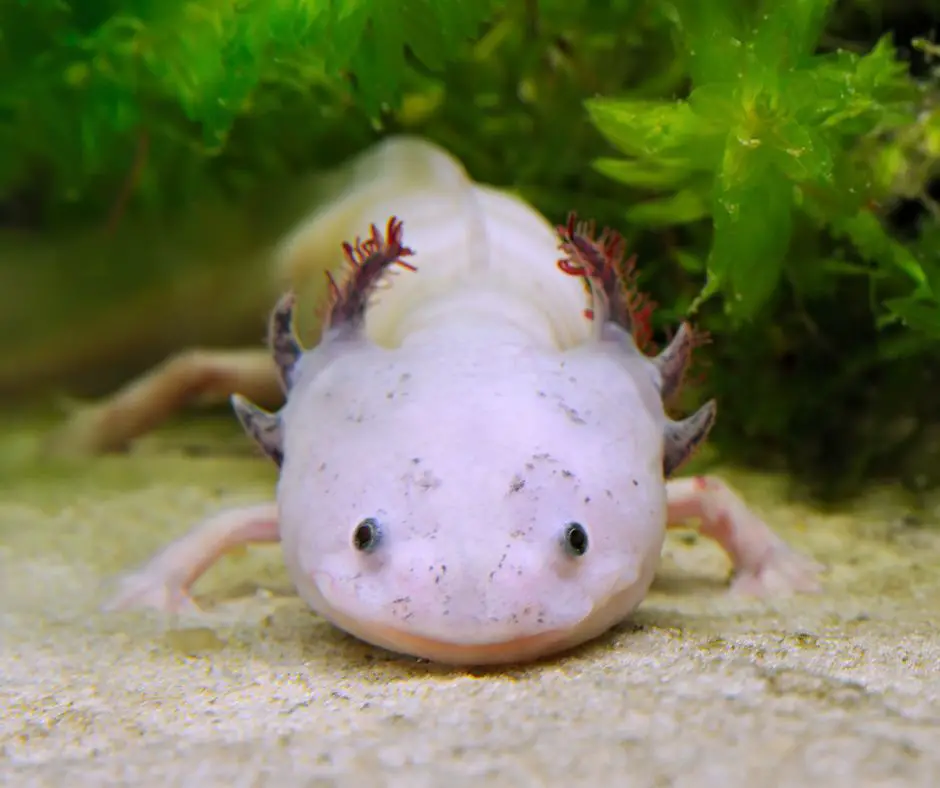
If your axolotl has eaten a bit of turtle food, you must note the following:
- Quantity of Food Eaten
If your pet only ate a little bit of food, one or two small turtle food pellets, then it should be fine. Observe your pet and wait for it to have a bowel movement.
- Your pet’s behavior
Continue monitoring your pet for the next few hours:
- Is your axolotl constipated?
- Is it floating?
- Does it appear to be lethargic and not swimming?
- How is its appetite?
If you notice it hasn’t pooped or seems lethargic, you could cool your axolotl by fridging it. Fridging helps stimulate the bowels so your axolotl can poop.
- Stop Feeding Turtle Food To Your Axolotl
We hope you can see now that feeding improper food can have several negative repercussions on your axolotl’s health. Therefore, it is best to steer clear of it.
Feed only vet-approved axolotl pellets along with fresh/live foods like shrimp, worms, etc. This is important for your axolotl health and wellbeing.
What Is the Best Food for Axolotls?
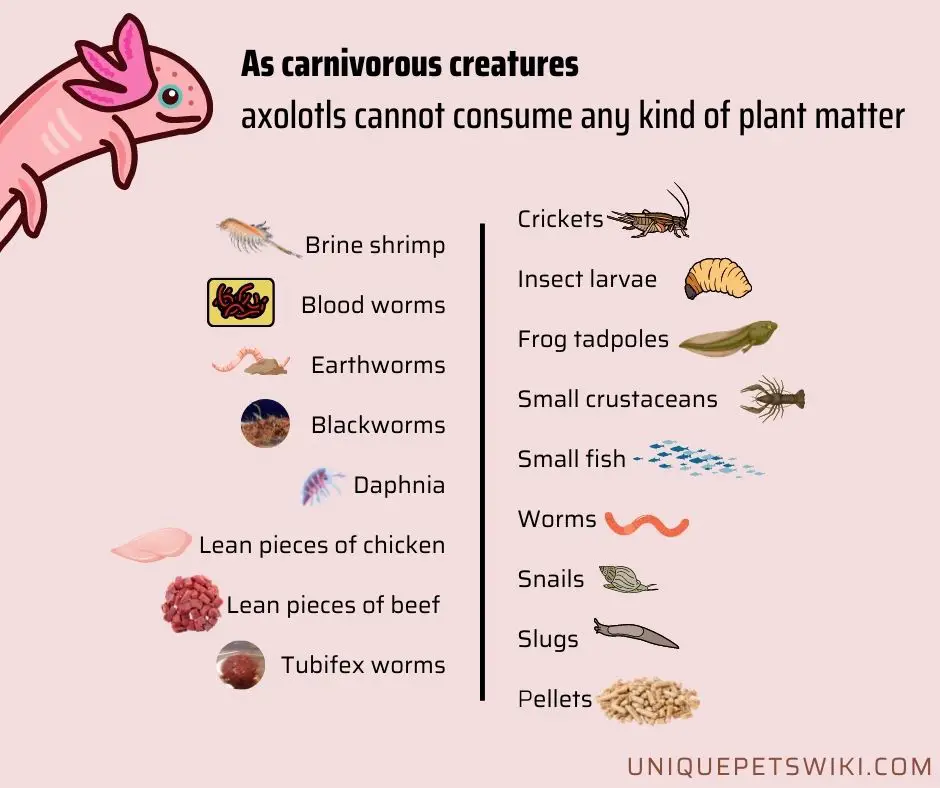
Axolotls can eat certain pelleted food. Soft fish pellets, reptile pellets, or sinking salmon pellets are great choices although, these days, you get pellets specially formulated for axolotls.
However, pelleted food is not the only food you must feed axolotls. They also need live and fresh foods like insects, worms, and shrimp. These are necessary to provide your pet with important minerals such as calcium.
In their natural habitats, axolotls eat crustaceans, mollusks, and fish so it makes sense to feed them these diverse foods in captivity as well.
You can also feed lean chicken, beef, bits of canned tuna, chopped pork organs, etc. to your pet once in a while.
Earthworms, mealworms, bloodworms, daphnia, crickets, mini shrimp, guppies, snails, and slugs are some great food choices to incorporate into an axolotl’s diet.
Remember to cut up the worms into small pieces (no bigger than 1 cm long) making it easier for your pet to swallow.
What Food Can Axolotls Not Eat?
Axolotls should never eat any human foods as most are highly processed. Processed foods can cause digestive upsets in your pet. Even processed meats like hot dogs, bologna, or salami should never be fed to axolotls.
Also, refrain from feeding them hard foods. Remember: axolotls do not chew their food and they swallow it whole. Hard food could remain stuck in their bellies and lead to digestive issues.
Invert Aquatics Soft Pellets for Axolotls
- Quick Sinking
- Advanced Daily Nutrition
- Moist Sinking Pellets
- New Look! Same Great Food!
Last update on 2022-12-30 / Affiliate links / Images from Amazon Product Advertising API
Key Takeaways – Can Axolotls Eat Turtle Food?
Axolotls should never be fed turtle food as it is not nutritionally balanced. Turtle food is also rich in carbohydrates and low in protein. Over time, turtle food could lead to nutritional deficiencies as well as hormonal imbalance in your pet.
We hope this guide helps you make the best food choices for your pet.
